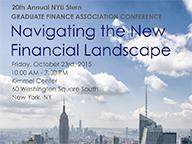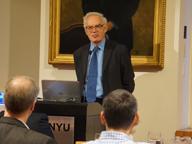Faculty News
—
Professor Daniel Altman is interviewed about Nigeria's economy
—

Excerpt from CNBC Africa -- "... if you look at the level of urbanization and the level of living standards, they track quite well across counties around the world. And Nigeria is right on trend. It's right in the middle of the trend, in fact. So for the level of urbanization that it has, its living standards are just about where you'd expect them to be."
Faculty News
—

Excerpt from CNBC Africa -- "... if you look at the level of urbanization and the level of living standards, they track quite well across counties around the world. And Nigeria is right on trend. It's right in the middle of the trend, in fact. So for the level of urbanization that it has, its living standards are just about where you'd expect them to be."




















